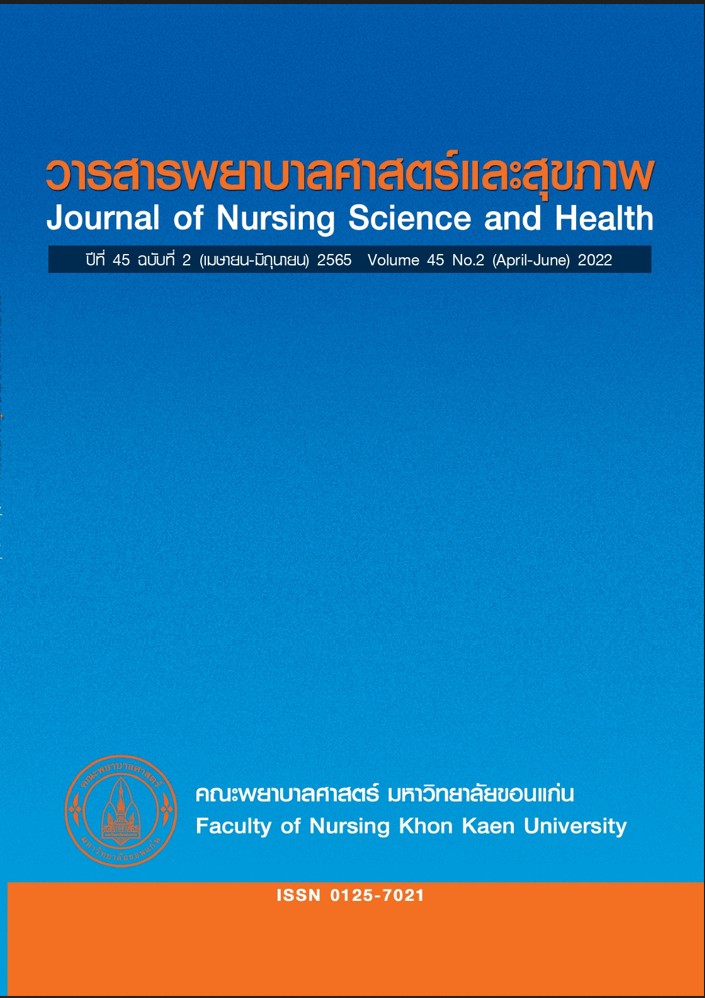Effects of a self-management program on Interdialytic weight in patients undergoing HD in Indonesia
Keywords:
fluid overload, hemodialysis, interdialytic weight gain, self-managementAbstract
The aims of this quasi-experimental study were to examine the effects of a self-management program on interdialytic weight gain (IDWG) among patients with end-stage renal disease (ESRD) undergoing hemodialysis (HD) at Muhammadiyah Lamongan hospital, Indonesia. A total of 40 patients were enrolled in this study according to the inclusion criteria. Participants were randomly assigned to either the intervention (n=20) or control group (n=20). The intervention group received the 5-week program in addition to usual care, while the control group received only usual care. Self-management program was developed based on self-management concept by Kanfer, promote self-management behavior among patients with ESRD undergoing HD on fluid management. The research instrument was examined by five experts for validating the contents as well as seeking suggestions and opinion in the study. The content validity index (CVI) was 0.96. IDWG were collected through measurement of the weight of the patients before and after HD, at the first week and the fifth week of the program. Data were analyzed using descriptive statistics, paired t-test, and independent t-test.
Results revealed that after program completion at week 5, IDWGs of intervention group were significantly lower than those of the control group (p=.002). The findings indicated that self-management program provided an effective practical model for improving patient fluid management and decreasing IDWG. Therefore, self-management program should be incorporated into nursing practice for individuals with ESRD undergoing HD.
References
Directorate of control and prevention of non-communicable diseases (P2PTM). Chronic kidney disease. Available from:http://p2ptm.kemkes.go.id/activity-p2ptm/subdit-disease-jantung-dan-perembuluhblood/ginjal-kronis [Accessed 2 February
Indonesian Renal Registry, Indonesian Renal Registry. Indonesia Renal Registry.2018;46.
Ministry of Health Financing and Health Insurance Center, Ministry of Health Financing and Health Insurance Center. Pusat Data dan Informasi - Kementerian Kesehatan Republic of Indonesia [Internet]. 2017 [cited 2020 Oct 13]. Available from:https://pusdatin.kemkes.go.id/article/view/17050400001/situasipenyakit-ginjal-kronis.html.
Howren MB, Kellerman QD, Hillis SL,Cvengros J, Lawton W, Christensen AJ. Effect of a behavioral self-regulation intervention on patient adherence to fluid-intake restrictions in hemodialysis: A randomized controlled trial. Ann behav med 2016;50(2):167–76.
Kalantar-Zadeh K, Regidor DL, Kovesdy CP, Van Wyck D, Bunnapradist S, Horwich TB, et al. Fluid retention is associated with cardiovascular mortality in patients undergoing long-term hemodialysis. Circulation 2009;119(5):671–9.
Movilli E, Gaggia P, Zubani R, Camerini C, Vizzardi V, Parrinello G, et al. Association between high ultrafiltration rates and mortality in uraemic patients on regular haemodialysis. A 5-year prospective observational multicentre study. Nephrology Dialysis Transplantation 2007;22(12):3547–52.
Smith K, Coston M, Glock K, Elasy TA, Wallston KA, Ikizler TA, et al. Patient perspectives on fluid management in chronic hemodialysis. Journal of Renal Nutrition 2010;20(5):334-41.
Office registration Lamongan Muhammadiyah Hospital, Office registration Lamongan Muhammadiyah Hospital, The number of hemodialysi patients at Muhammadiyah Lamongan Hospital; 2016.
Wang H, Naghavi M, Allen C, Barber RM, Bhutta ZA, Carter A, et al. Global, regional, and national life expectancy, all-cause mortality, and cause-specific mortality for 249 causes of death, 1980–2015: A systematic analysis for the global burden of disease study 2015. The Lancet 2016;388(10053):1459-544.
Griva K, Mooppil N, Seet P, Krishnan DSP, James H, Newman SP. The NKF-NUS HD trial protocol - A randomized controlled trial to determine the effectiveness of a self-management intervention for HD patients. BMC Nephrol 2011;12(1):4.
Tong A, Sainsbury P, Chadban S, Walker RG, Harris DC, Carter SM, et al. Patients’ experiences and perspectives of living with CKD. American Journal of Kidney Diseases 2009;53(4):689-700.
Sharp J, Wild MR, Gumley AI. A systematic review of psychological interventions for the treatment of nonadherence to fluid-intake restrictions in people receiving hemodialysis. American Journal of Kidney Diseases 2005;45(1):15–27.
Witchunee Sritong NM. View of effects of self-management program with reminder system via line application to prevent volume overload among patients receiving HD [Internet]. [cited 2022 Feb 11]. Available from: https://he01.tci-thaijo.org/index.php/nah/article/ view/250540/170120
Choi ES, Lee J. Effects of a face-to-face self-management program on knowledge, self-care practice and kidney function in patients with chronic kidney disease before the renal replacement therapy. J Korean Acad Nurs 2012;42(7):1070.
Kanfer FH, Gaelick-Buys L. Self-management methods. In: Elmsford NY, editors, Helping people change: A textbook of methods, 4th ed. US: Pergamon Press; 1991:p.305–60.
Kauric-Klein Z, Peters RM, Yarandi HN.Self-efficacy and blood pressure self-care behaviors in patients on chronic hemodialysis. West J Nurs Res 2017;39(7):886-905.
Nursalam N, Dian Kurniawati N, Priyantini D, Rian Patma Putri I. Automatic reminder for fluids management on confidence and compliance with fluid restrictions in HD patients. SRP [Internet]. 2020 Jun 1 [cited 2022 Feb 13];11(05). Available from: http://www.sysrevpharm.org//index.php?fulltxt=108461&fulltxtj=196&fulltxtp=196-1589897269.
Husain F, Kusuma H, Johan A. Effects of peer support program on self-management in patients with end-stage renal disease under going hemodialysis. Nurs Med J Nursing 2020;10(2):171–81.
Chironda G, Bhengu B. Contributing factors to non-adherence among chronic kidney disease (ckd) patients: A systematic review of literature. Abdelkader Boukerrouche [Internet]. 2016 [cited 2020 Oct 12];02(04). Available from: http://medical-clinicalreviews.imedpub.com/contributing-factorsto-nonadherence-among-chronic-kidneydisease-ckdpatients-a-systematic-review-ofliterature.php?aid=17499.
Mailani F, Bakri SO. The duration of HDtreatment and the adherence of chronic kidney disease patients in fluid intake limitation: A relationship. IJNS 2020;2(1):43-8.
Dantas LGG, de Seixas Rocha M, Junior JAM, Paschoalin EL, Paschoalin SRKP, Sampaio Cruz CM. Non-adherence to haemodialysis, Interdialytic weight gain and cardiovascular mortality: A cohort study. BMC Nephrol 2019;20(1):402.
Jain AK, Blake P, Cordy P, Garg AX. Global trends in rates of peritoneal dialysis. J Am Soc Nephrol 2012;23(3):533-44.
Movilli E, Gaggia P, Zubani R, Camerini C, Vizzardi V, Parrinello G, et al. Association between high ultrafiltration rates and mortality
in uraemic patients on regular haemodialysis. A 5-year prospective observational multicentre study. Nephrology Dialysis Transplantation 2007;22(12):3547-52.
Downloads
Published
How to Cite
Issue
Section
License
Copyright (c) 2022 Journal of Nursing Science and Health

This work is licensed under a Creative Commons Attribution-NonCommercial-NoDerivatives 4.0 International License.
The Journal of Nursing Science and Health is copyright holder of published articles. Distributions of articles published in Journal of Nursing Science and Health including online, photocopying which is not for teaching-learning purpose, publication submission elsewhere are prohibited except obtaining permission from the Journal of Nursing Science and Health.



